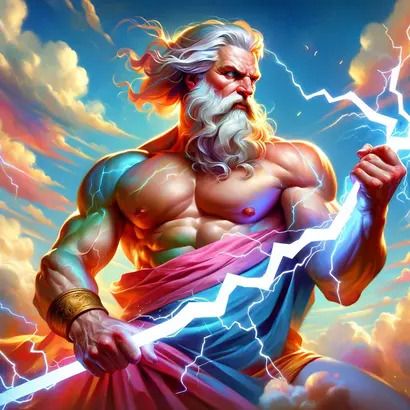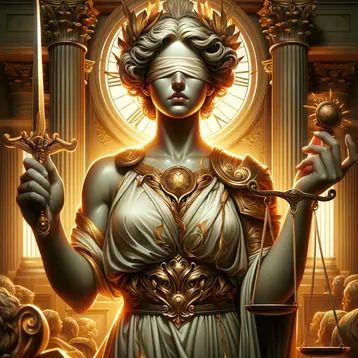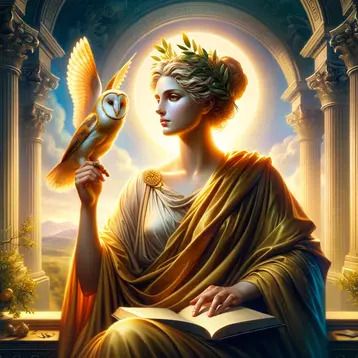
Zeus
⚡ Zeus :: Greek God of the Sky and Thunder, King of the Gods
Zeus is the Olympian god of the sky and the thunder, the king of all other gods and men, and, consequently, the chief figure in Greek mythology. The son of Cronus and Rhea, he is probably most famous for his infidelity to his sister and wife, Hera. Athena, Apollo and Artemis, Hermes, Dionysus, Heracles, Helen of Troy, and the Muses are all children of his numerous erotic affairs. Hephaestus, Hebe, and Ares are his legitimate children.
Zeus’ Role
Zeus' Name
Zeus’ name is thought to have originated from the Ancient Greek word for “bright.” The word has a close connection with dies, which is the Latin word for 'day' and has a very ancient history. Therefore, many mythologists believe that Zeus is one of the oldest Greek gods.
Zeus' Portrayal and Symbolism
Usually, Zeus is portrayed with a scepter in one hand and a thunderbolt in the other – both symbols of his authority. Sometimes he wears a crown of oak leaves – the oak was deemed to be his sacred tree. Homer repeatedly describes him as “aegis-bearing”: the Aegis was an enormous shield which Zeus frequently carried with him, lending it to his daughter Athena from time to time. In addition, he owns a pet: a giant golden eagle called Aetos Dios.
Zeus' Roles and Epithets
Considered the ruler of heavens and the governor of weather, Zeus was also associated with wisdom and awareness, with authority and destiny, with battles and power. In fact, Homer says that before the fight between Achilles and Hector, Zeus weighed their lots and blessed the outcome. Further down, the poet even claims that Zeus owns two urns filled with ills and blessings – the gifts which he gives to every mortal in the amount he decides.
In relation to the many other roles Zeus had, he acquired many different epithets. Some of them are: “warlike,” “oath-keeper,” “guest-patron,” “All-Greek,” and “Savior.”
Zeus’ Biography
Zeus' Family
Paradoxically, Zeus is both the youngest and the oldest son of Cronus and Rhea. Namely, soon after the Creation of the world, the then-ruler of the Gods Cronus – who had learned that one of his children would overthrow him – swallowed Zeus’ three sisters and two brothers at birth: Demeter, Hera, Hestia, Hades, and Poseidon. Zeus would have been eaten himself if Rhea hadn’t slipped Cronus a stone wrapped in swaddling clothes in his place, hiding her youngest child in a cave on the Cretan Mount Ida.
Zeus' Infancy
There, Zeus was raised by nymphs and met his first wife, Metis – or Wisdom. On her advice, he masked himself as an Olympian cupbearer and tricked his father into drinking poisoned wine. The wine made Cronus vomit so much that he ultimately disgorged Zeus’ siblings – intact and ready for revenge. This, their second birth, made the youngest among them – Zeus – actually their oldest brother.
Titanomachy: War for Supremacy
Thus, they had no problem in acknowledging his authority. Led by him – and helped by the one-eyed Cyclopes and the hundred-handed Hecatoncheires (Zeus freed all of them from Cronus’ imprisonment) – the siblings overthrew Cronus and the Titans during a decade-long war called the Titanomachy.
Zeus, the Ruler of the Gods
Zeus and his brothers drew lots to share the world between them. Poseidon got the sea, Hades the underworld, and Zeus the sky. Finally, Zeus was crowned to be the Ruler of all Gods and Men, referred to universally as Father.
Zeus’ Rule Challenged
Gigantomachy and Typhoeus
However, Zeus didn’t get off to a great start. His grandmother Gaia was angry at him for imprisoning the Titans, so she summoned her children, the Gigantes, to avenge her. Another war followed – the Gigantomachy – but the Olympians prevailed once again. This enraged Gaia even more, so she gave birth to Typhoeus, a giant fire-blowing serpentine monster, so mighty that even Zeus needed some help (from Hermes and Pan) to defeat him after a cataclysmic battle.
Filial Revolt
As a young ruler, Zeus was apparently too prideful and petulant. So, Hera, Poseidon and Apollo – and, maybe, everyone else but Hestia – decided to teach him a lesson. While he was sleeping, they stole his thunderbolt and bound him with hundred-knotted cords. Zeus was powerless, but the Nereid Thetis acted quickly and called Briareus, the Hecatoncheir, who used his hundred arms to untie him in a second. Zeus brutally punished the three leaders of the rebellion (especially Hera), and they swore to never challenge him again.
Prometheus and Zeus
Prometheus, however, did – first by stealing the divine fire and giving it to the mortals, and then by keeping away from Zeus the identity of a mortal woman whose future son was prophesized to become greater than his father. Zeus chained Prometheus to a rock and tormented him for ages, but Prometheus stubbornly refused to reveal to him the secret. In the end, for reasons we don’t know (because a large part of the play where this story is told is lost), the Titan did tell Zeus that the woman in question is Thetis, so the god stopped pursuing her and gave her to Peleus. The son born out of this marriage became a celebrated Greek hero - in fact, possibly the greatest among them all: Achilles.
Zeus’ Women
Zeus’ Wives
According to Hesiod, Zeus had the very same problem with his first wife, Metis. Warned that their child may be a threat to him, Zeus decided to swallow his pregnant wife. Nevertheless, the child, fully grown and armored, was eventually born – but from the forehead of Zeus. It was none other than Athena, the goddess of wisdom herself.
Afterward, Zeus married Themis, who bore him the Horae and the Fates. His third wife was Eurynome, who brought the Charites to the world. His sister Demeter followed; she gave birth to Persephone. With his fifth wife, Mnemosyne, Zeus begot the Muses. After becoming Zeus’ sixth wife, Leto became the mother of Apollo and Artemis.
Zeus’ seventh and final wife was his sister, Hera. Knowing her sympathy for animals, he wooed her as a virgin by transforming himself into a distressed little cuckoo, which Hera took in her arms to warm it. At that moment, Zeus turned back into himself and slept with her. Ashamed, Hera agreed to marry him.
Zeus' Lovers
However, theirs would prove to be a bittersweet marriage, because Zeus, to say the least, was a promiscuous god. Bearing the shape of many different animals, he had numerous love affairs with many nymphs and mortals, which made Hera jealous; some say that, when she scolded him for this, disguised as a serpent, he even slept with his mother, Rhea. Consequently, many gods and heroes are Zeus’ children. It’s impossible to list them all.
Zeus’ Equivalents
Zeus is called Jupiter in Roman mythology. Additionally, his powers, symbolism and some of the stories woven around him, are similar to those of some other deities, such as the Norse gods Thor and Odin, the Hinduist deity Indra, and the Slavic thunder god Perun.
Zeus: Myths and Hidden Truths
One common misconception about Zeus is that he was an infallible and wise ruler, always making fair judgments and displaying exemplary behavior. In reality, Zeus was known for his numerous infidelities, bouts of jealousy, and sometimes vindictive actions against those who crossed him.
Another misconception is that Zeus was solely a god of thunder and lightning, ignoring his roles as a protector of justice, hospitality, and oaths. These lesser-known aspects of his character allow for a more well-rounded understanding of Zeus' influence and importance in Greek mythology.
Zeus and Xenia
A fascinating, yet often overlooked, fact about Zeus is his connection to the ancient Greek concept of Xenia, the code of hospitality that governed the relationship between guest and host. As the protector of travelers and the enforcer of Xenia, Zeus played a crucial role in ensuring that guests were treated with respect and kindness, and that hosts were likewise honored by their visitors. This aspect of his character highlights the importance of social order and reciprocity in ancient Greek society.
Zeus and Dodona
Another lesser-known fact about Zeus is his association with the oracle of Dodona, one of the oldest and most important oracles in the ancient world. Located in Epirus in northwestern Greece, the oracle was dedicated to Zeus and his consort, Dione, and was famous for its sacred oak tree, where the rustling of leaves was believed to reveal the god's will. This connection to the oracle and the ancient practice of divination further underscores Zeus' role as a dispenser of wisdom and guidance in the lives of the ancient Greeks.
Unraveling Zeus: Mighty Ruler of Greek Mythology
In our experience exploring the fascinating world of Greek mythology, we have found ourselves particularly captivated by the omnipotent figure of Zeus. When we first delved into the various myths and legends, it was hard not to be in awe of his incredible power and authority, which seemed to permeate every tale. We vividly remember the excitement we felt when we learned of the Titanomachy, the war for supremacy, and how Zeus ultimately triumphed over his adversaries.
Our favorite part, however, was the poetic justice in the tale of Zeus' infancy, where his own cunning and intelligence allowed him to turn the tables on his father, Cronus. As we continued to explore Zeus' life, we were struck by the complexity of his relationships, especially his countless affairs and the resulting progeny. These stories serve as a constant reminder that even the most powerful figures have their weaknesses and face their own trials and tribulations. Overall, our journey into the life of Zeus has been nothing short of mind-blowing, leaving us with a deeper appreciation for the rich tapestry of Greek mythology.
Zeus Sources
Zeus is pervasive in ancient literary sources. You can read about him practically anywhere. A good start would be Hesiod’s “Theogony” and Aeschylus “Prometheus Bound.”
See Also: The Creation, Titanomachy, Hera, Metis, Themis, Eurynome
Zeus Video
Zeus Q&A
Zeus Associations
Link/Cite Zeus Page
Written by: The Editors of GreekMythology.com. GreekMythology.com editors write, review and revise subject areas in which they have extensive knowledge based on their working experience or advanced studies.
For MLA style citation use: GreekMythology.com, The Editors of Website. "Zeus". GreekMythology.com Website, 29 Feb. 2024, https://www.greekmythology.com/Olympians/Zeus/zeus.html. Accessed 25 April 2024.






